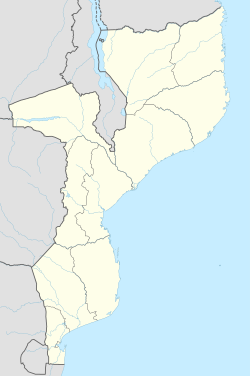
Mozambique, officially the Republic of Mozambique, is a country located in southeastern Africa bordered by the Indian Ocean to the east, Tanzania to the north, Malawi and Zambia to the northwest, Zimbabwe to the west, and Eswatini and South Africa to the southwest. The sovereign state is separated from the Comoros, Mayotte and Madagascar by the Mozambique Channel to the east. The capital and largest city is Maputo.
Mozambique was a Portuguese colony, overseas province and later a member state of Portugal. It gained independence from Portugal in 1975.

The Kionga Triangle was a small region of German East Africa situated at the mouth of the Ruvuma River. The Ruvuma served as the border between the German colony and Portuguese Mozambique, and the Kionga Triangle was the only section of German East Africa south of the river. Its principal settlement was Kionga which had a population of 4,000 in 1910. It became a German possession in 1894 but came under Portuguese control in April 1916 during World War I. The post-war Treaty of Versailles reaffirmed that the river was the border between Tanganyika, then under British control, and Portuguese Mozambique. The triangle was the only territory that the treaty awarded to Portugal.

FRELIMO is a democratic socialist political party in Mozambique. It is the dominant party in Mozambique and has won a majority of the seats in the Assembly of the Republic in every election since the country's first multi-party election in 1994.

The Makua people, also known as Makhuwa or Wamakua, are a Bantu ethnic group found in northern Mozambique and the southern border provinces of Tanzania such as the Mtwara Region. They are the largest ethnic group in Mozambique, and primarily concentrated in a large region to the north of the Zambezi River.

RENAMO is a Mozambican political party and militant group. The party was founded with the active sponsorship of the Rhodesian Central Intelligence Organisation (CIO) in May 1977 from anti-communist dissidents opposed to Mozambique's ruling FRELIMO party. RENAMO was initially led by André Matsangaissa, a former senior official in FRELIMO's armed wing, and was composed of several anti-communist dissident groups which appeared immediately prior to, and shortly following, Mozambican independence. Matsangaissa, who died in 1979, was succeeded by Afonso Dhlakama, who led the organization until his death in 2018. He was succeeded by Ossufo Momade.

The Makonde are an ethnic group in southeast Tanzania, northern Mozambique, and Kenya. The Makonde developed their culture on the Mueda Plateau in Mozambique. At present they live throughout Tanzania and Mozambique, and have a small presence in Kenya. The Makonde population in Tanzania was estimated in 2001 to be 1,140,000, and the 1997 census in Mozambique put the Makonde population in that country at 233,358, for an estimated total of 1,373,358. The ethnic group is roughly divided by the Ruvuma River; members of the group in Tanzania are referred to as the Makonde, and those in Mozambique as the Maconde. The two groups have developed separate languages over time but share a common origin and culture.
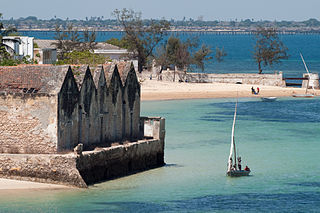
The Island of Mozambique lies off northern Mozambique, between the Mozambique Channel and Mossuril Bay, and is part of Nampula Province. Prior to 1898, it was the capital of colonial Portuguese East Africa. With its rich history and sandy beaches, the Island of Mozambique is a UNESCO World Heritage Site and one of Mozambique's fastest-growing tourist destinations. It has a permanent population of approximately 14,000 people and is served by nearby Lumbo Airport on the Nampula mainland. The name of the country, Mozambique, is derived from the name of this island.

The Mozambican Civil War was a civil war fought in Mozambique from 1977 to 1992. Like many regional African conflicts during the late twentieth century, the impetus for the Mozambican Civil War included local dynamics exacerbated greatly by the polarizing effects of Cold War politics. The war was fought between Mozambique's ruling Marxist Mozambique Liberation Front (FRELIMO), the anti-communist insurgent forces of the Mozambican National Resistance (RENAMO), and a number of smaller factions such as the PRM, UNAMO, COREMO, UNIPOMO, and FUMO.

The Niassa Company or Nyassa Chartered Company was a royal company in the Portuguese colony of Mozambique, then known as Portuguese East Africa, that had the concession of the lands that include the present provinces of Cabo Delgado and Niassa between 1891 and 1929.

Education in Mozambique is organized by three main stages: primary education, secondary education and higher education. Although having a national public education system, several educational programmes and initiatives in Mozambique are mainly funded and supported by the international community.
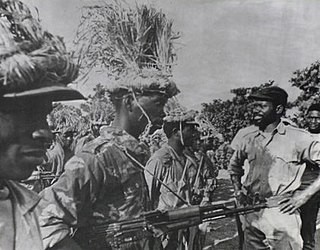
The Mozambican War of Independence was an armed conflict between the guerrilla forces of the Mozambique Liberation Front or FRELIMO and Portugal. The war officially started on September 25, 1964, and ended with a ceasefire on September 8, 1974, resulting in a negotiated independence in 1975.
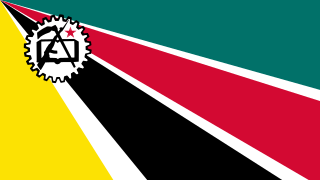
The People's Republic of Mozambique was a socialist state that existed in present day Mozambique from 1975 to 1990.
The Diocese of Lebombo is a diocese in the Anglican Church of Mozambique and Angola. It is one of the three Anglican dioceses of Mozambique. This diocese is the most southerly of the three, the others being the Diocese of Niassa and the Diocese of Nampula.
Henry Edward O'Neill FRGS, FRAS, RN, (1848–1925) was a Royal Navy officer and British explorer of central Africa. He served as HBM consul, Mozambique. O'Neill was a Fellow of the Royal Astronomical Society and Royal Geographical Society, as well as an Honorary Corresponding Member of the Scottish Geographical Society. He was the 1882 recipient of the Royal Geographical Society's Back Award and the 1885 recipient of their Patron's Medal.

The Sena people are a Bantu ethnolinguistic group with origins in northwestern region of Mozambique, Sofala Province and Zambezia Province. They are also found in Malawi and Zimbabwe near their respective borders with Mozambique.
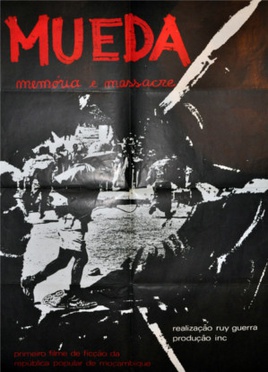
Mueda, Memória e Massacre is a 1979 Mozambican film directed by Ruy Guerra and considered the country's first feature fiction film. The film captures the annual theatrical re-enactment of the Mueda Massacre of 1960 that left over 600 peaceful protesters dead.

Reinata Sadimba is a Mozambican ceramicist who produces work that originates in traditional Makonde pottery, while incorporating her own techniques and conceptions of femininity and motherhood. She is considered among the most important contemporary sculptors in Mozambique.
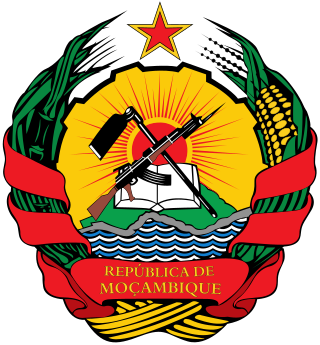
Mozambican nationality law is regulated by the Constitution of Mozambique, as amended; the Nationality Law and Nationality Regulation, and their revisions; and various international agreements to which the country is a signatory. These laws determine who is, or is eligible to be, a national of Mozambique. The legal means to acquire nationality, formal legal membership in a nation, differ from the domestic relationship of rights and obligations between a national and the nation, known as citizenship. Nationality describes the relationship of an individual to the state under international law, whereas citizenship is the domestic relationship of an individual within the nation. Mozambican nationality is typically obtained under the principle of jus soli, i.e. by birth in the territory, or jus sanguinis, i.e. by birth in Mozambique or abroad to parents with Mozambican nationality. It can be granted to persons with an affiliation to the country, or to a permanent resident who has lived in the country for a given period of time through naturalization.

